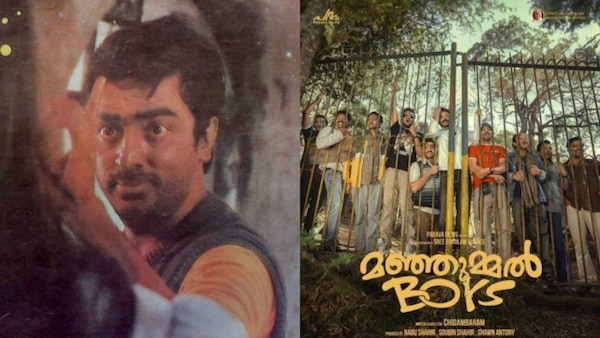Kamal Haasan sowed the seed, so Manjummel Boys could eat the fruits 30 years later
The contribution of Kamal Haasan's Guna in facilitating Manjummel Boys ascent in the hearts of Tamil audiences cannot be overstated.

Last Updated: 02.10 PM, Mar 05, 2024
If you haven't heard, the latest Malayalam movie Manjummel Boys is a smash hit at the box office , nearing the Rs 100 crore mark worldwide. The most surprising aspect comes from Tamil Nadu, historically known for its muted response to movies from other languages, especially Malayalam.
While Tamil Nadu is known for its undying love for celebrating cinema and its talents, it is also very cautious when extending its support to other language films. Typically, only exceptionally well-made movies make a mark at the state box office, with spectacle films receiving warm receptions. Directors like SS Rajamouli and Prashanth Neel have been major draws there.
Despite the cultural, political, and artistic proximity between Malayalam and Tamil audiences, Malayalam films often struggle to appeal to the mass audience in Tamil Nadu. This paradox is evident when cinephiles publicly praise Malayalam cinema but don't show up at the box office when new Malayalam films are released.
However, when a Malayalam film resonates with the audience, the love it receives is limitless. For instance, in 2015, Alphonse Puthren's Premam ran in Chennai cinemas for over 250 days, compared to its 175 days in Kerala.
Kamal's lasting impact on culture and art
Nearly a decade later, Tamil audiences have found another Malayalam movie to shower their love on – Manjummel Boys . This film has struck a chord with Tamil audiences worldwide, and the contribution of Kamal Haasan's Guna in facilitating Manjummel Boys ascent in the hearts of Tamil audiences cannot be overstated.
Guna itself was a box office disaster during its original release. Released during the Pongal of 1991, Kamal's masterclass performance portrayed a disillusioned youth from an underprivileged background, discovering his angel in a girl from a royal lineage. Unfortunately, it lost out to Superstar Rajinikanth's gangster classic Thalapathi.
Since then, Guna has grown in stature, achieving a cult following among cinema fanatics who marvel at Kamal's highly refined artistic sensibilities. The evergreen song Kanmani Anbodu, which cast its spell 30 years ago, continues to sway audiences worldwide.
The song Kanmani Anbodu captures Guna, a man with a tormented soul and body, finally experiencing moments of happiness before his world unravels. Guna ultimately succeeds in persuading Rohini to believe she is Abhirami, the goodness put on earth to save him from his sufferings. It's also the moment that Abhirami realizes that Guna is her guardian angel.
ALSO READ: Amid Manjummel Boys success, here's how Kamal Haasan, Ilaiyaraaja conjured up iconic Kanmani Anbodu
The song begins with Guna trying to express his deeper feelings in the form of a letter to Abhirami. Since he doesn't know how to write, he farms out the responsibility to Abhirami. As Abhirami takes dictation from Guna, the letter transforms into a heartfelt poem and that poem becomes a beautiful song.
Kamal wanted to establish a simple truth with Kanmani Anbodu. He wanted to demonstrate that you don't need to have a massive vocabulary and transcending imagination to become a poet or write something that will move people across generations. You just need to be honest in describing how you feel. Then even the simplest of words assume transcendental powers.
"Manithar Unarnthu Kolla, Ithu Manitha Kaathal Alla.. Athaiyum Thaandi Punithamaanathu.. (Mere mortals cannot comprehend this love. The purity of this love transcends human imaginations)," sings Guna in a high pitch, creating echoes inside the crevices of the Devil's Kitchen.
What other song can perfectly capture the dogged efforts of a group of friends, who take on the forces of nature to pull their friend out from the depths of hell?
The untold risks behind Guna
Not many have known the risks that Kamal and his team took to shoot Guna against the backdrop of the Devil's Kitchen. It wasn't until director Chidambaram discussed the challenges involved in making Manjummel Boys while expressing his admiration for Kamal's determination to accomplish such massive cinematic wonders with the seemingly rudimentary filmmaking technology available back in the day.
Kamal's artistic bravery to venture into uncharted territories not only paved the way for cinematic wonders like Guna but also ignited a spark in filmmakers like Chidambaram, motivating them to explore unconventional locations, harness innovative storytelling techniques, and embrace the challenges that come with pushing the limits of technology. Kamal crawled through the thorny landscape of cinema, allowing Chidambaram to run.
Like all great artistic achievements, not every noble effort of Kamal Haasan was rewarded immediately. But, when the intentions go beyond the simple profit and loss considerations, the lasting impact becomes evident in the cultural and artistic legacy.
Kamal must have known that he could not reap the fruits of his labour in the short term. And that he was only preparing the launchpad for future generations of filmmakers, who could can take off without any hassle. The iconic line from Kamal's Thevar Magan comes to mind. "You cannot expect to plant the seed and eat the fruit the same day. Today, I sow the seed and you will reap the fruits tomorrow and then it will be your son and his son. We might not be around to see it, but we will be the one who sowed the seeds for them," Sivaji Ganesan's Periyasamy Thevar tells a self-centred Sakthivel (Kamal Haasan).
Kamal sang Kanmani Anbodu over 30 years ago, tuning the sensibilities of the audiences to a higher level, so the Manjummel Boys could plant the seed and eat the fruits on the same day in the postmodernism era.

